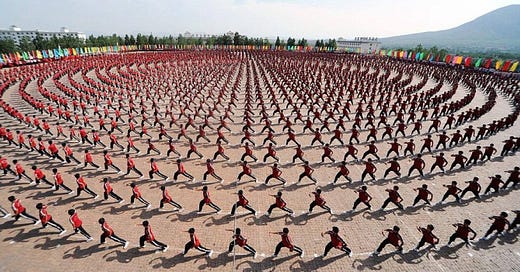On 36,000 Kung Fu Fighters
There's this question some of us who train MMA (mixed martial arts) and other combat sports ask: "Why train traditional martial arts?" I also asked this in my early arrogance. Why put up with all the traditions and rituals? I'm here for personal improvement, not tradition. But whenever I see a mass martial arts demonstration moving in harmony, I'm moved by the participants, and I find my answer in their shared spirit.
In the West, many of our endeavors emphasize us. This is how we're conditioned, and it becomes an unquestionable default. What's stressed is individual achievements. However, even individual achievements take a group (often unrecognized) and the invisible labor of others.
Consider what narratives we're drawn to—what narratives we're constantly shown? What needs to be said for one vs. a hundred? It's individualistic and heroic. But there's an invisible elegance to being a part of a collective that goes unappreciated. It is not a metaphor to say the invisible collective makes the world go round. And far too many sacrificed themselves during the pandemic to maintain our capitalist routines. A pandemic that has yet to cease and sacrifices still being made, primarily by our most poor, vulnerable, and non-white, that's no longer domestically reported. The forgotten underclass.
The demand from the West now is for the world to return to work, just as they have, regardless of the sacrifices to the racialized world. So that the individuals, the "heroic" (and white) business magnates (and their friends), can prosper.
Growing up in the US, many Western ideals were alien to me. I had a different idea of the "self," which was more collective. I am a social relationship with others.
Perhaps for many Westerners (who are open-minded), traditional martial arts are entry into a non-occidental view of the collective experience. To be in communion with something greater than themselves that has nothing to do with religion or an eternal father in the sky.
Chasing our dreams often means chasing our individuality. If the aim were to be the best team player—an anonymous piece of an ensemble that solves a tremendous puzzle—few would consider that a "dream." But why dream when you can do?
There are young martial artists throughout the world, racialized and oppressed, in the poorest and most looted of places (individualism is the privilege of looting), showing the awe-inspiring beauty of being part of something greater than themselves—the martial arts. They're cogs in an infinite wheel moving in symmetry and unity. And though many of us dislike feeling small and anonymous, there is a remarkable beauty to unison fluidity, like particles in a cosmic chain reaction expanding to something greater. Martial arts solidarity.
Individualism, whether it's meals only for yourself, personalized meal delivery, personal pleasures, your own room or place, individual achievements, personal demands, personal practice, private lessons, private tutors, private schools, personalized health, private insurance, individual property, private community, pampering yourself, teaching your kids not to share, inheritance, calling the manager, or the luxury of having to think only of yourself and your perspective, is expensive and gated. Which is why it's the standard for the West and the ruler they use to measure the world they have looted.
Then, for the looted world, the only access to joy, play, and meaning is with others. The bare essentials. It so happens that individualism is alienating. Access to guns is not the only reason why the US has the most mass shootings. The West's individualism, alienation, and fascism, therefore, frame martial arts. Training for defense of the group or preservation of culture is mocked. Training is only meant for the self and for self-improvement. To Western hegemony, martial arts as cultural resistance is unrecognizable and antithetical.
Some see martial arts as self-defense or as tools for anti-fascism. There's necessity and value in that. But martial arts are cultural and philosophical products, and if you extract from them and reduce them to only their self-defense utility, then that's as reactionary as any other reductionism and traditional knowledge extraction. What martial arts are to you as an individual does not define what they are. What you as an individual want from them does not determine what they can offer. They are much more than you. They are more than your value system.
It's not just about how you can adapt, change, and individualize martial arts but also how martial arts can adapt, change, and collectivize you. You are you, but you can also be much more than you. You can be one and one of many.
Martial arts are a social relationship. Mutual and bidirectional.
⁂
(If you like my work, please support me on Patreon or make a one-time donation on Ko-fi. Find Southpaw at the website. Get the swag at Spring. Also check out Liberation Martial Arts Online.)





